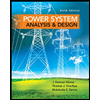
Introductory Circuit Analysis; Laboratory Manual For Introductory Circuit Analysis Format: Kit/package/shrinkwrap
13th Edition
ISBN: 9780134297446
Author: Boylestad, Robert L.
Publisher: Prentice Hall
expand_more
expand_more
format_list_bulleted
Textbook Question
Chapter 24, Problem 30P
Repeat Problem 28 if each phase impedance is changed to a 20
Expert Solution & Answer
Want to see the full answer?
Check out a sample textbook solution
Students have asked these similar questions
An RLE load is operating in chopper circuit from a 500 V de source as shown in Fig. (I) For
R = 0, L = 0.064 and constant E, the duty cycle is 0.2
(a) Derive the expression for the lo(max) and lo(min) for type A chopper, supplying RLE load.
Also, derive the expression for The maximum peak to peak ripple current.
(b) Find the chopping frequency to limit the amplitude of load current excursion to 10 A.
Fig.(1)
www
reeer
E
Q1) An RLE load is operating in chopper circuit from a 500 V dc source as shown in Fig.(1) For
R=0, L= 0.064 and constant E, the duty cycle is 0.2
(a) Derive the expression for the lo(max) and lo(min) for type A chopper, supplying RLE load.
Also, derive the expression for The maximum peak to peak ripple current.
(b) Find the chopping frequency to limit the amplitude of load current excursion to 10 A.
Vs
www
R
Fig.(1)
E
04)
A converter is feeding an RL load as shown in Fig. 2 with Vs = 220 V, R = 52, L = 7.5 mH,
f=1 kHz, d=0.5, and E=0 V. Calculate (a) the minimum instantaneous load current (b) the peak
instantaneous load current, (c) the maximum peak-to-peak load ripple current, (d) the average value
of load current la, (e) the rms load current lo, (f) the effective input resistance Ri seen by the source,
(g) the rms chopper current, and (h) the critical value of the load inductance for continuous load
current.
Chopper
FWD
500000
R
Fig.2
LL
Chapter 24 Solutions
Introductory Circuit Analysis; Laboratory Manual For Introductory Circuit Analysis Format: Kit/package/shrinkwrap
Ch. 24 - A balanced V load having a 10 resistance in each...Ch. 24 - Repeat Problem 1 if each phase impedance is...Ch. 24 - Repeat Problem 1 if each phase impedance is...Ch. 24 - The phase sequence for the Y-Y system in Fig....Ch. 24 - Repeat Problem 4 if each phase impedance are...Ch. 24 - Repeat Problem 4 if each phase impedance is...Ch. 24 - For the system in Fig. 24.43, find the magnitude...Ch. 24 - Computer the magnitude of the voltage EAB for the...Ch. 24 - For the Y-Y system in Fig. 24.45: a. Find the...Ch. 24 - For the Y-Y system of Fig. 24.46 the impedance of...
Ch. 24 - A balanced load having a 20 resistance in each...Ch. 24 - Repeat Problem 11 if each phase impedance is...Ch. 24 - Repeat Problem 11 if each phase impedance is...Ch. 24 - The phase sequence for the Y- system in Fig....Ch. 24 - Repeat Problem 14 if each phase impedance is...Ch. 24 - Repeat Problem 14 if each phase impedance are...Ch. 24 - Prob. 17PCh. 24 - For the connected load in Fig. 24.49: a. Find the...Ch. 24 - A balanced V load having a 30 resistance in each...Ch. 24 - Repeat Problem 19 if each phase impedance is...Ch. 24 - Prob. 21PCh. 24 - Prob. 22PCh. 24 - Prob. 23PCh. 24 - Repeat Problem 22 if each phase impedance is...Ch. 24 - Prob. 25PCh. 24 - Prob. 26PCh. 24 - Prob. 27PCh. 24 - The phase sequence for the - system in Fig....Ch. 24 - Repeat Problem 28 if each phase impedance is...Ch. 24 - Repeat Problem 28 if each phase impedance is...Ch. 24 - Prob. 31PCh. 24 - Prob. 32PCh. 24 - Prob. 33PCh. 24 - Find the total watts, volt-amperes reactive,...Ch. 24 - Prob. 35PCh. 24 - Find the total watts, volt-amperes reactive,...Ch. 24 - Find the total watts, volt-amperes reactive,...Ch. 24 - Prob. 38PCh. 24 - Prob. 39PCh. 24 - Find the total watts, volt-amperes reactive,...Ch. 24 - A balanced, three-phase, -connected load has a...Ch. 24 - A balanced, three-phase, Y-connected load has a...Ch. 24 - Find the total watts, volt-amperes reactive,...Ch. 24 - The Y-Y system in Fig. 24.53 has a balanced load...Ch. 24 - Prob. 45PCh. 24 - Prob. 46PCh. 24 - Repeat Problem 46 for the network in Fig. 24.47.Ch. 24 - For the three-wire system in Fig. 24.55, properly...Ch. 24 - Sketch three different ways that two wattmeters...Ch. 24 - For the Y- system in Fig. 24.56: Determine the...Ch. 24 - For the system in Fig. 24.57: Calculate the...Ch. 24 - For the three-phase, three-wire system in Fig....
Knowledge Booster
Learn more about
Need a deep-dive on the concept behind this application? Look no further. Learn more about this topic, electrical-engineering and related others by exploring similar questions and additional content below.Similar questions
- - From these 2 truth tables (A and B), develop- The unsimplified function- Karnaugh's map- Simplified function- The schematic design of the circuit from the simplified function- The Circuit in Tinkercad from the simplified function (include Screenshots and Link circuits in Tinkercad)arrow_forwardBuild the respective truth tables, the Schematic Design of the unsimplified circuit, only with NAND logic gates, based on the following boolean functions: a) (X * Y)’ + Zb) ((A + B) * Z)’arrow_forwardDevelop the steps of Analog Digital Conversion (ADC) of the following analog signal, considering the signal sampling analog (gray square values), the quantization of the signal itself, the encoding of the quantization result in binary code and the resulting pulse train.arrow_forward
- Determine the values of the necessary resistances, design and run the circuit in TINKERCAD for an integrated 555 Astable with T1 (on time) of 8 seconds and a T2 (off time) of 4 seconds. The value for capacitor C1 must be 100 uF (0.0001 F).arrow_forward- What are Flip Flop circuits used for? Explain the operation of an R-S Flip Flop.- What function do Multiplexers or MUXs perform?arrow_forward- What function do Demultiplexers or DEMUX perform?- According to the implementation of automation circuits with ARDUINO boards, what would they be, Conceptually, the main components of any system of automation? Draw a representative schematic or block diagram.arrow_forward
- Solve problems 5.2 in detail and thank youarrow_forward5.1 Determine the three zone settings for the relay Rab in the system shown in Figure 5.26. The system nominal voltage is 138 kV, and the positive sequence impedances for the various elements are given in the figure. The transformer impedance is given in ohms as viewed from the 138 kV side. Assume that the maximum load at the relay site is 120 MVA, and select a CT ratio accordingly. The available distance relay has zone 1 and zone 2 settings from 0.2 to 10 2, and zone 3 settings from 0.5 to 40 2, in increments of 0.1 2. The angle of maximum torque can be adjusted to 75° or 80°. Remember that the zone 3 of the relay must back up the line BC, as well as the transformer. A Rab (3+j40) B (2+ j50) (0+j9) с Fu D Figure 5.26 System for problem 5.1arrow_forwardPlease solve question 4.7 in detail and thank youarrow_forward
arrow_back_ios
SEE MORE QUESTIONS
arrow_forward_ios
Recommended textbooks for you
 Power System Analysis and Design (MindTap Course ...Electrical EngineeringISBN:9781305632134Author:J. Duncan Glover, Thomas Overbye, Mulukutla S. SarmaPublisher:Cengage Learning
Power System Analysis and Design (MindTap Course ...Electrical EngineeringISBN:9781305632134Author:J. Duncan Glover, Thomas Overbye, Mulukutla S. SarmaPublisher:Cengage Learning Electricity for Refrigeration, Heating, and Air C...Mechanical EngineeringISBN:9781337399128Author:Russell E. SmithPublisher:Cengage Learning
Electricity for Refrigeration, Heating, and Air C...Mechanical EngineeringISBN:9781337399128Author:Russell E. SmithPublisher:Cengage Learning

Power System Analysis and Design (MindTap Course ...
Electrical Engineering
ISBN:9781305632134
Author:J. Duncan Glover, Thomas Overbye, Mulukutla S. Sarma
Publisher:Cengage Learning

Electricity for Refrigeration, Heating, and Air C...
Mechanical Engineering
ISBN:9781337399128
Author:Russell E. Smith
Publisher:Cengage Learning
02 - Sinusoidal AC Voltage Sources in Circuits, Part 1; Author: Math and Science;https://www.youtube.com/watch?v=8zMiIHVMfaw;License: Standard Youtube License